(新)高中英语听力强化训练--Test-9英语听力doc
- 格式:doc
- 大小:1.36 MB
- 文档页数:6
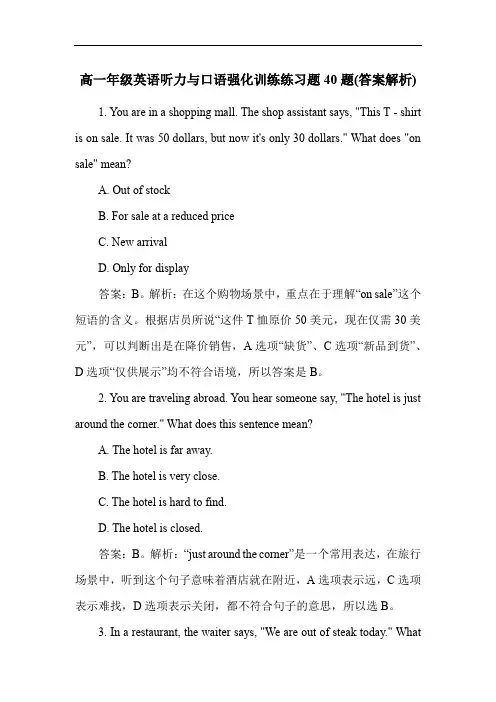
高一年级英语听力与口语强化训练练习题40题(答案解析)1. You are in a shopping mall. The shop assistant says, "This T - shirt is on sale. It was 50 dollars, but now it's only 30 dollars." What does "on sale" mean?A. Out of stockB. For sale at a reduced priceC. New arrivalD. Only for display答案:B。
解析:在这个购物场景中,重点在于理解“on sale”这个短语的含义。
根据店员所说“这件T恤原价50美元,现在仅需30美元”,可以判断出是在降价销售,A选项“缺货”、C选项“新品到货”、D选项“仅供展示”均不符合语境,所以答案是B。
2. You are traveling abroad. You hear someone say, "The hotel is just around the corner." What does this sentence mean?A. The hotel is far away.B. The hotel is very close.C. The hotel is hard to find.D. The hotel is closed.答案:B。
解析:“just around the corner”是一个常用表达,在旅行场景中,听到这个句子意味着酒店就在附近,A选项表示远,C选项表示难找,D选项表示关闭,都不符合句子的意思,所以选B。
3. In a restaurant, the waiter says, "We are out of steak today." Whatdoes it mean?A. Steak is free today.B. There is no steak today.C. Steak is very expensive today.D. Steak is the special today.答案:B。
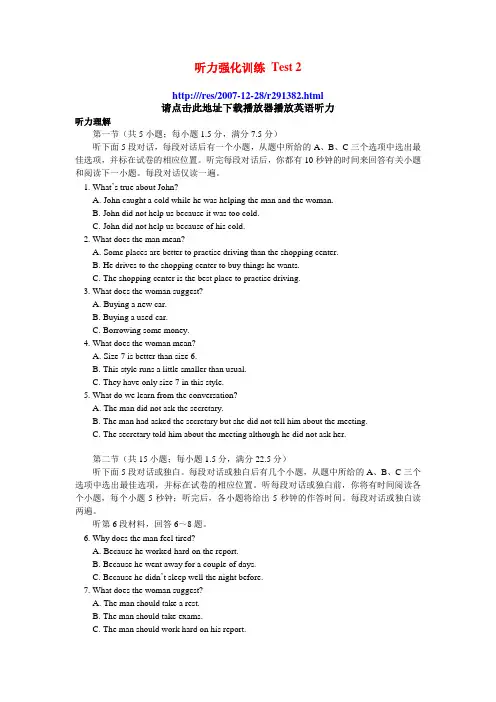
听力强化训练Test 2http:///res/2007-12-28/r291382.html请点击此地址下载播放器播放英语听力听力理解第一节(共5小题;每小题1.5分,满分7.5分)听下面5段对话,每段对话后有一个小题,从题中所给的A、B、C三个选项中选出最佳选项,并标在试卷的相应位置。
听完每段对话后,你都有10秒钟的时间来回答有关小题和阅读下一小题。
每段对话仅读一遍。
1. What’s true about John?A. John caught a cold while he was helping the man and the woman.B. John did not help us because it was too cold.C. John did not help us because of his cold.2. What does the man mean?A. Some places are better to practise driving than the shopping center.B. He drives to the shopping center to buy things he wants.C. The shopping center is the best place to practise driving.3. What does the woman suggest?A. Buying a new car.B. Buying a used car.C. Borrowing some money.4. What does the woman mean?A. Size 7 is better than size 6.B. This style runs a little smaller than usual.C. They have only size 7 in this style.5. What do we learn from the conversation?A. The man did not ask the secretary.B. The man had asked the secretary but she did not tell him about the meeting.C. The secretary told him about the meeting although he did not ask her.第二节(共15小题;每小题1.5分,满分22.5分)听下面5段对话或独白。
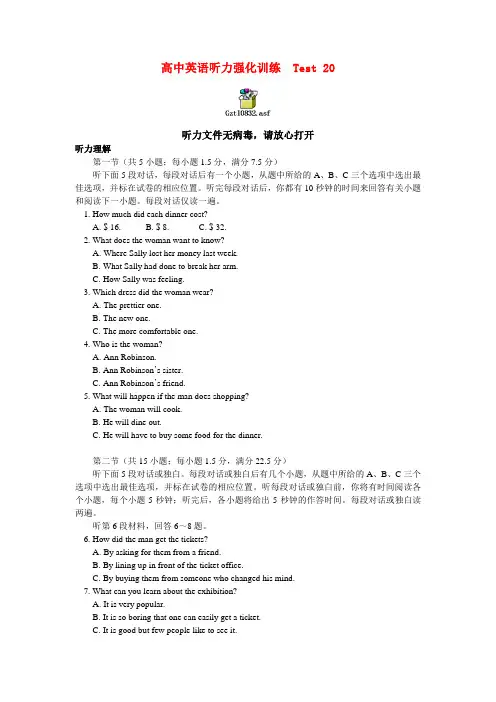
高中英语听力强化训练 Test 20听力文件无病毒,请放心打开听力理解第一节(共5小题;每小题1.5分,满分7.5分)听下面5段对话,每段对话后有一个小题,从题中所给的A、B、C三个选项中选出最佳选项,并标在试卷的相应位置。
听完每段对话后,你都有10秒钟的时间来回答有关小题和阅读下一小题。
每段对话仅读一遍。
1. How much did each dinner cost?A. $ 16.B. $ 8.C. $ 32.2. What does the woman want to know?A. Where Sally lost her money last week.B. What Sally had done to break her arm.C. How Sally was feeling.3. Which dress did the woman wear?A. The prettier one.B. The new one.C. The more comfortable one.4. Who is the woman?A. Ann Robinson.B. Ann Robinson’s sister.C. Ann Robinson’s friend.5. What will happen if the man does shopping?A. The woman will cook.B. He will dine out.C. He will have to buy some food for the dinner.第二节(共15小题;每小题1.5分,满分22.5分)听下面5段对话或独白。
每段对话或独白后有几个小题,从题中所给的A、B、C三个选项中选出最佳选项,并标在试卷的相应位置。
听每段对话或独白前,你将有时间阅读各个小题,每个小题5秒钟;听完后,各小题将给出5秒钟的作答时间。
每段对话或独白读两遍。
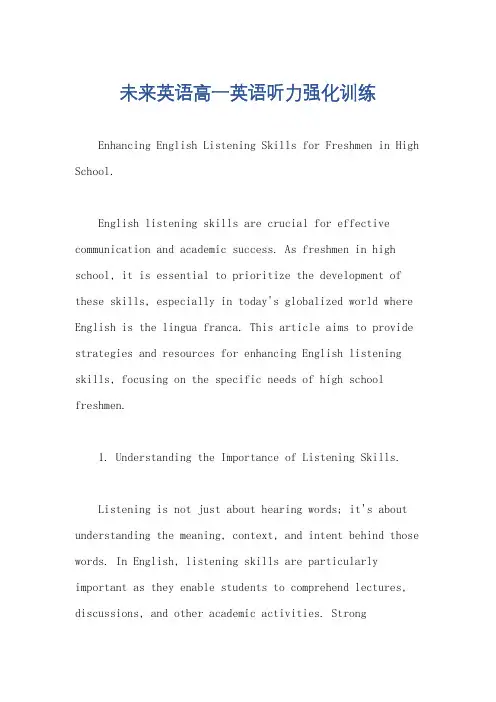
未来英语高一英语听力强化训练Enhancing English Listening Skills for Freshmen in High School.English listening skills are crucial for effective communication and academic success. As freshmen in high school, it is essential to prioritize the development of these skills, especially in today's globalized world where English is the lingua franca. This article aims to provide strategies and resources for enhancing English listening skills, focusing on the specific needs of high school freshmen.1. Understanding the Importance of Listening Skills.Listening is not just about hearing words; it's about understanding the meaning, context, and intent behind those words. In English, listening skills are particularly important as they enable students to comprehend lectures, discussions, and other academic activities. Stronglistening skills also foster better speaking, reading, and writing abilities.2. Overcoming Common Challenges.As freshmen, you may encounter several challenges in developing your English listening skills. These include:Language Barrier: If English is not your native language, you may struggle with understanding native speakers due to different pronunciations, accents, and speeds.Distractions: In a classroom environment, it can be easy to get distracted by classmates, your own thoughts, or external noises.Limited Practice: Unless you actively seek out opportunities to practice, it can be difficult to improve your listening skills.3. Strategies for Improvement.Here are some strategies to help you improve your English listening skills:Regular Practice: Dedicate time each day to listening activities such as watching English movies, listening to podcasts, or following English news channels.Active Listening: Practice active listening by focusing on the speaker, taking notes, and askingclarifying questions when needed.Vary Your Inputs: Expose yourself to a variety of English speaking sources to familiarize yourself with different accents and speeds.Use Technology: Utilize language learning apps, online resources, and subtitles to enhance your understanding.4. Resources for Freshmen.There are numerous resources available to help freshmenimprove their English listening skills:Schools and Teachers: Your school and teachers can provide valuable resources such as textbooks, audio recordings, and classroom activities designed to improve listening skills.Online Platforms: Websites like TED, VOA, BBC, and others offer a wide range of English speaking content that can be accessed for free.Social Media: Platforms like YouTube, Instagram, and Facebook are rich in English-speaking content. You can follow English-speaking influencers, language learning channels, or simply watch English-speaking videos for practice.5. Conclusion.Developing English listening skills as a high school freshman is an ongoing process that requires dedication, practice, and patience. By understanding the importance oflistening skills, overcoming common challenges, and implementing strategies for improvement, you can significantly enhance your English proficiency. Remember, every little step counts, and with consistent effort, you will see improvement in your listening abilities.。
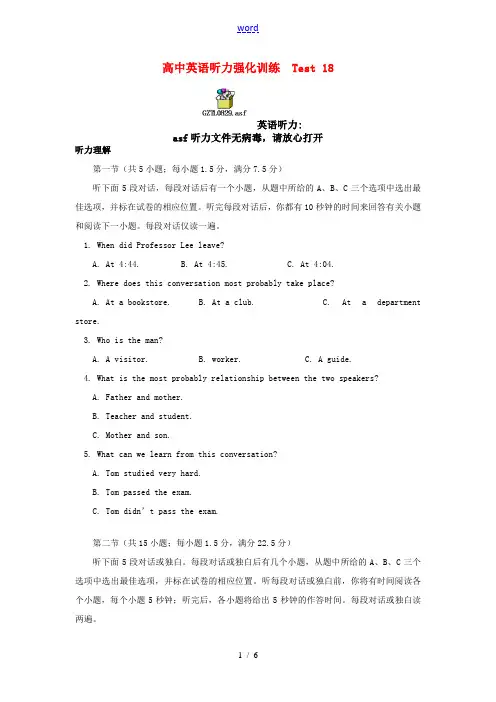
高中英语听力强化训练 Test 18英语听力:asf听力文件无病毒,请放心打开听力理解第一节(共5小题;每小题1.5分,满分7.5分)听下面5段对话,每段对话后有一个小题,从题中所给的A、B、C三个选项中选出最佳选项,并标在试卷的相应位置。
听完每段对话后,你都有10秒钟的时间来回答有关小题和阅读下一小题。
每段对话仅读一遍。
1. When did Professor Lee leave?A. At 4:44.B. At 4:45.C. At 4:04.2. Where does this conversation most probably take place?A. At a bookstore.B. At a club.C. At a department store.3. Who is the man?A. A visitor.B. worker.C. A guide.4. What is the most probably relationship between the two speakers?A. Father and mother.B. Teacher and student.C. Mother and son.5. What can we learn from this conversation?A. Tom studied very hard.B. Tom passed the exam.C. Tom didn’t pass the exam.第二节(共15小题;每小题1.5分,满分22.5分)听下面5段对话或独白。
每段对话或独白后有几个小题,从题中所给的A、B、C三个选项中选出最佳选项,并标在试卷的相应位置。
听每段对话或独白前,你将有时间阅读各个小题,每个小题5秒钟;听完后,各小题将给出5秒钟的作答时间。
每段对话或独白读两遍。
听第6段材料,回答6~8题。
6. What does the woman do?A. She teaches history at that school.B. She is a student of Chinese history.C. She is a student of Chinese.7. What is the woman doing?A. She is asking questions.B. She is having a walk.C. She is going to the office.8. What do you know about the man?A. He is a teacher of history.B. He knows of the woman very well.C. He is going to leave the school.听第7段材料,回答9~11题。
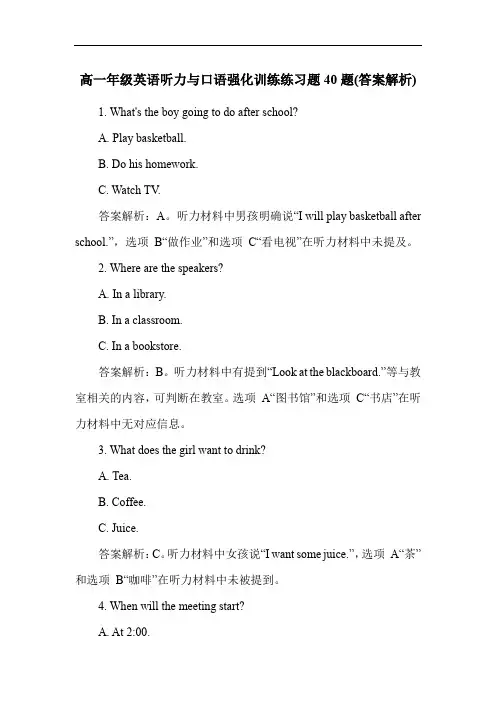
高一年级英语听力与口语强化训练练习题40题(答案解析)1. What's the boy going to do after school?A. Play basketball.B. Do his homework.C. Watch TV.答案解析:A。
听力材料中男孩明确说“I will play basketball after school.”,选项B“做作业”和选项C“看电视”在听力材料中未提及。
2. Where are the speakers?A. In a library.B. In a classroom.C. In a bookstore.答案解析:B。
听力材料中有提到“Look at the blackboard.”等与教室相关的内容,可判断在教室。
选项A“图书馆”和选项C“书店”在听力材料中无对应信息。
3. What does the girl want to drink?A. Tea.B. Coffee.C. Juice.答案解析:C。
听力材料中女孩说“I want some juice.”,选项A“茶”和选项B“咖啡”在听力材料中未被提到。
4. When will the meeting start?A. At 2:00.B. At 2:30.C. At 3:00.答案解析:B。
听力材料中有“ The meeting will start at half past two.”,即2:30。
选项A 和C 的时间在听力材料中无依据。
5. What color is the girl's bag?A. Red.B. Blue.C. Green.答案解析:A。
听力材料中女孩说“My bag is red.”,选项B“蓝色”和选项C“绿色”在听力材料中未出现。
6. Who is the teacher talking to?A. A student.B. A parent.C. Another teacher.答案解析:A。
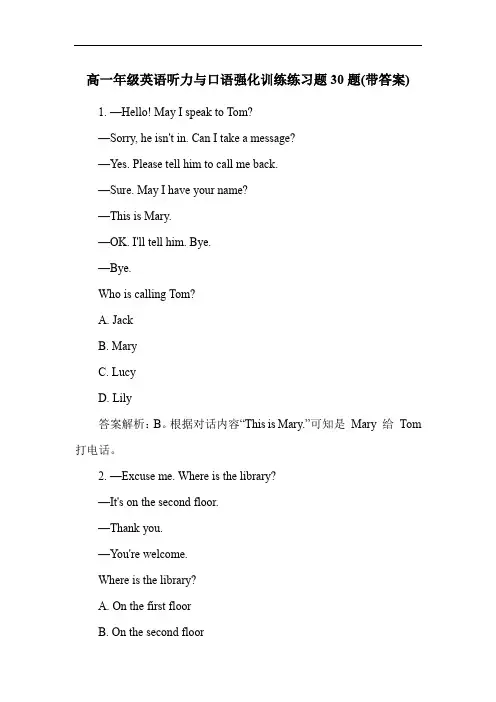
高一年级英语听力与口语强化训练练习题30题(带答案)1. —Hello! May I speak to Tom?—Sorry, he isn't in. Can I take a message?—Yes. Please tell him to call me back.—Sure. May I have your name?—This is Mary.—OK. I'll tell him. Bye.—Bye.Who is calling Tom?A. JackB. MaryC. LucyD. Lily答案解析:B。
根据对话内容“This is Mary.”可知是Mary 给Tom 打电话。
2. —Excuse me. Where is the library?—It's on the second floor.—Thank you.—You're welcome.Where is the library?A. On the first floorB. On the second floorC. On the third floorD. On the fourth floor答案解析:B。
根据对话内容“It's on the second floor.”可知图书馆在二楼。
3. —What's your favorite subject?—My favorite subject is English.—Why do you like it?—Because it's interesting.What's the speaker's favorite subject?A. MathB. ChineseC. EnglishD. History答案解析:C。
根据对话内容“My favorite subject is English.”可知说话者最喜欢的科目是英语。
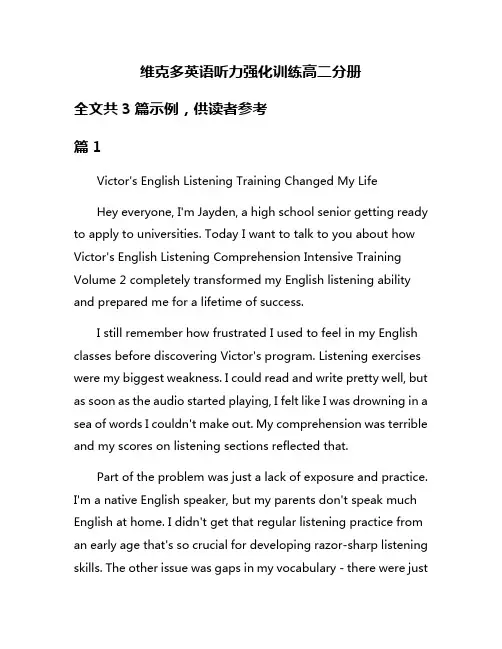
维克多英语听力强化训练高二分册全文共3篇示例,供读者参考篇1Victor's English Listening Training Changed My LifeHey everyone, I'm Jayden, a high school senior getting ready to apply to universities. Today I want to talk to you about how Victor's English Listening Comprehension Intensive Training Volume 2 completely transformed my English listening ability and prepared me for a lifetime of success.I still remember how frustrated I used to feel in my English classes before discovering Victor's program. Listening exercises were my biggest weakness. I could read and write pretty well, but as soon as the audio started playing, I felt like I was drowning in a sea of words I couldn't make out. My comprehension was terrible and my scores on listening sections reflected that.Part of the problem was just a lack of exposure and practice. I'm a native English speaker, but my parents don't speak much English at home. I didn't get that regular listening practice from an early age that's so crucial for developing razor-sharp listening skills. The other issue was gaps in my vocabulary - there were justso many common English words and expressions I hadn't mastered yet.I knew I had to find a way to take my listening to the next level if I wanted to achieve my academic and career goals. That's when my English tutor introduced me to Victor's program. From the very first Unit 1 lesson, I could tell this was something special.The curriculum is incredibly well-designed to systematically build both your core listening skills and vocabulary over the course of the book. It starts you off with relatively simple conversations between two people, but you'd be amazed how many valuable listening strategies and language points there are to pick up, even at that level. Victor breaks everything down in such a clear, step-by-step way in the detailed lesson notes.As you progress through the units, the language gets more complex and contextualized, and you start analyzing longer dialogues, speeches, lectures, news reports, and more. But Victor is a master teacher and gives you all the tools you need to succeed at each new level. The example audio is superhigh-quality, the accents are authentic, and the topics are so fascinating and relevant.For each lesson, you start by doing a bunch of pre-listening activities to build the context and vocabulary you'll need. Thenyou listen to the audio passage while completing comprehension activities. Finally, there are post-listening tasks to cement what you've learned and explore even deeper. The variety of activity types is awesome - there are lectures, true/false questions, note-taking, summarizing, discussing critical thinking questions, and plenty more.I was a complete listening newbie when I started, but by working through Victor's systematic curriculum, I rapidly leveled up my skills. I learned crucial strategies like listening for context clues, separating facts from opinions, recognizing idioms and connotations, and structuring information as I heard it. My vocabulary expanded exponentially across all those diverse topics. Maybe most importantly, I became a more confident, proactive listener who didn't panic when I missed a word or two.With Victor as my guide, I bravely took on more advanced material like academic lectures, documentary narration, and debates between native speakers. Certain lessons were brutally hard at first, but that payoff when it finally clicked was unbeatable. Victor's teaching reminded me that discomfort is the price of growth.By the end of Volume 2, my transformation was complete. I could easily understand complex listening passages that wouldhave been gibberish to me before. My grades skyrocketed thanks to my improved listening comprehension on tests. Group discussions became a breeze as I caught every nuance of what my classmates said. Podcasts, movies, YouTube videos - suddenly English just sounded so clear.I'm so grateful I discovered this incredible program. Thanks to Victor, I've become the skillful, well-rounded English listener I needed to be to unlock opportunities at top universities and beyond. If you're a high school student looking to take your English listening to the highest level, you absolutely must go through Victor's Listening Comprehension Intensive Training. It's as simple as that. The road won't be easy - you'll have to dig in and apply yourself like never before. But the rewards will belife-changing, just like they were for me. What are you waiting for? Get Victor's books today and start your journey towards English listening mastery!篇2Victor's English Listening Comprehension Training Volume 2 - A High School Junior's PerspectiveWhat's up, guys? It's your boy Vic here to give you the full scoop on "Victor's English Listening ComprehensionReinforcement Training Volume 2 for Grade 11." As an 11th grader, listening comprehension has been a real struggle for me when it comes to English. This book has been a totalgame-changer though, really helping me level up my listening skills.I've got to be honest, when my English teacher first assigned this book, I wasn't exactly stoked. I thought it would just be some boring, dry listening exercises. Boy, was I wrong! This book is actually pretty engaging and useful.The book comes with QR codes that you can scan to listen to the audio tracks on your phone or laptop. Right off the bat, I appreciated how convenient this is. No more wrestling with CDs or tapes and trying to find a portable player. Just whip out your smartphone and you're ready to go.The audio tracks themselves cover all kinds of cool,high-interest topics that are relevant to our lives as teenagers. Things like social media, dating, pop culture, school life, you name it. The situations are all super relatable. It makes practicing listening comprehension way more fun when it's stuff you can actually picture yourself experiencing.What I really like though, is how the book systematically builds up your skills from easier to more difficult tracks. It startsyou off with shorter conversations between 2-3 people speaking at a moderate pace. As you progress through the units, the conversations get longer and faster with more speakers involved. By the end, you're listening to full-on lectures and talks. It's awesome to see yourself improving steadily from unit to unit.The exercises themselves are solid too. There are different types that really work out your listening muscles from multiple angles. You've got stuff like filling in blanks, true/false questions, putting pictures in order according to what you hear. Lots of variety to keep you engaged.My personal fave though? The role-play activities! For these, you listen to a conversation example and then you and a partner recreate a similar situation using guided prompts. It's crazy helpful for building the real-world skills you need to communicate effectively. Shoutout to the example where Brad asks Melissa out on a date - I may or may not have used that one to ask out Stacey from English Lit!Another cool part is how the book integrates other skills besides just pure listening. You'll encounter exercises that have you read short passages related to the listening topic. This helps reinforce vocab and reading comprehension while also prepping your brain for the listening part. There are some light writingprompts too, getting you to summarize what you heard or discuss your opinions. Honestly, it's a smart way to make it a complete English workout.Now I'm not gonna lie, this book does require you to put in some serious effort. The tracks are no joke, especially towards the end. You're gonna need to concentrate hard and use those critical thinking skills. But isn't that the point? The fact that it's challenging is what's going to take your English proficiency to another level.What also helps is how each unit comes with useful strategies and tips on strengthening your listening abilities. Things like contextual clues to look out for, keywords to focus on, ways to visualize what you're hearing. Solid advice that'll serve you well during tests and just in general when listening to English audio.To round it out, the book also comes packed with standard exam-style practice tests. NBD if you're not an exam gunner like me - these are valuable for benchmarking your progress. You can see how much more you're able to understand compared to when you started the book.Look, at the end of the day, "Victor's English Listening Comprehension Reinforcement Training Volume 2" is legit. Is it abit of a grind sometimes? For sure. But the results are well worth putting in the reps. My listening comprehension has improved so much since starting this book. Conversations I used to barely scrape by now feel like a breeze. Lectures that used to sound like word soup to me are way easier to follow along with.If you're a high school student looking to take your English listening game to the next level, this is absolutely the book for you. It's engaging, practical, covers all the bases, and will push you in a good way. Two thumbs up from me - just be ready to focus and put in the work. Your future self who can understand English audio like a boss will thank you.篇3Victor's Listening Comprehension: A Journey Through Struggles and GrowthEnglish has always been a thorn in my side, a subject that seemed to mock me with its intricate rules and vast vocabulary. However, when my teacher introduced us to "Victor's English Listening Comprehension Reinforcement Training Volume 2," a glimmer of hope emerged amidst the darkness of my struggles.At first glance, the thick, spiral-bound book appeared intimidating, filled with pages upon pages of exercises andactivities. But as I delved into its contents, I realized that this was no ordinary textbook. It was a meticulously crafted guide, designed to take us on a journey through the complexities of the English language, one step at a time.The book's structure was well-organized, divided into units that covered various themes and topics relevant to our daily lives. From casual conversations to academic discussions, each unit presented a diverse range of listening materials, ensuring that we were exposed to a wide array of accents, dialects, and speaking styles.One of the aspects that truly set this book apart was the comprehensive approach it took to developing our listening skills. Each unit began with pre-listening activities that stimulated our minds and prepared us for the upcoming material. We would engage in discussions, brainstorming sessions, and vocabulary-building exercises, laying the foundation for a deeper understanding of the content.Then came the main event – the listening passages themselves. These were no ordinary recordings; they were carefully curated to challenge us at every turn. From news reports to interviews, radio plays to lectures, each passagepresented a unique set of obstacles that tested our comprehension abilities to the fullest.But the true beauty of "Victor's Listening Comprehension" lay in its accompanying exercises. After each listening segment, we were presented with a variety of tasks that targeted different aspects of our understanding. Whether it was identifying main ideas, interpreting speaker's tones, or analyzing rhetorical devices, these exercises pushed us to think critically and actively engage with the material.What I found particularly helpful were the post-listening activities. These exercises allowed us to reflect on the content, discuss our insights with classmates, and even practice our speaking and writing skills by expressing our thoughts and opinions on the topics covered.As the weeks progressed, I could feel myself gradually improving. The once-daunting task of comprehending spoken English became more manageable, and I found myself picking up on nuances and details that had previously eluded me.Of course, the journey was not without its challenges. There were times when the accents seemed indecipherable, or the vocabulary was so advanced that I felt lost in a sea of unfamiliar words. But that's when the true value of "Victor's ListeningComprehension" shone through – its ability to adapt to our needs.The book provided ample opportunities for review and reinforcement. We could revisit particularly challenging passages, work through supplementary exercises, and even engage in group discussions to share our insights and strategies for overcoming obstacles.Moreover, our teacher played a crucial role in guiding us through this transformative experience. With their expertise and support, they helped us identify our weaknesses and provided personalized feedback, ensuring that we were constantly growing and improving.As the academic year drew to a close, I found myself reflecting on the progress I had made. What had once seemed like an insurmountable challenge had become a source of confidence and pride. English was no longer a language that intimidated me; it was a tool that I could wield with increasing proficiency, thanks to the invaluable lessons learned from "Victor's English Listening Comprehension Reinforcement Training Volume 2."Looking back, I realize that this book was more than just a collection of exercises; it was a testament to the power ofperseverance and the value of a well-structured learning journey. With each unit, I not only strengthened my listening skills but also gained a deeper appreciation for the nuances of language and the richness of diverse cultures.As I prepare to embark on the next chapter of my academic journey, I carry with me the lessons learned from "Victor's Listening Comprehension." The skills I've acquired will undoubtedly prove invaluable as I navigate the complexities of higher education and beyond.To my fellow students, I offer this advice: embrace the challenges that come your way, for they are opportunities for growth and self-discovery. And remember, with the right resources and a dedicated mindset, even the most daunting obstacles can be overcome, one step at a time.。
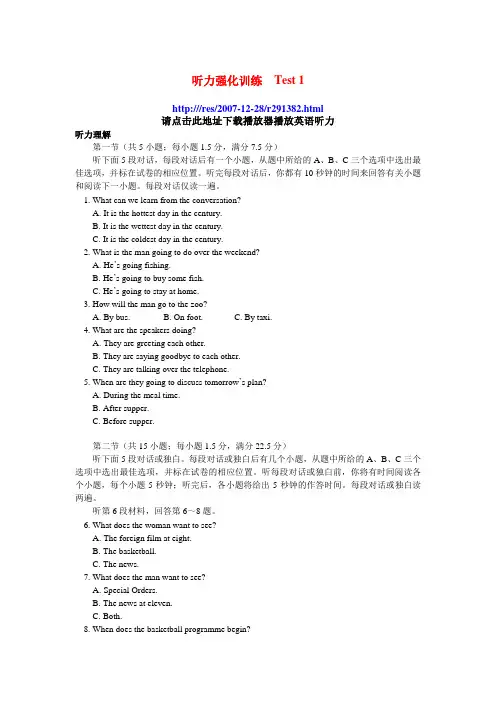
听力强化训练Test 1http:///res/2007-12-28/r291382.html请点击此地址下载播放器播放英语听力听力理解第一节(共5小题;每小题1.5分,满分7.5分)听下面5段对话,每段对话后有一个小题,从题中所给的A、B、C三个选项中选出最佳选项,并标在试卷的相应位置。
听完每段对话后,你都有10秒钟的时间来回答有关小题和阅读下一小题。
每段对话仅读一遍。
1. What can we learn from the conversation?A. It is the hottest day in the century.B. It is the wettest day in the century.C. It is the coldest day in the century.2. What is the man going to do over the weekend?A. He’s going fishing.B. He’s going to buy some fish.C. He’s going to stay at home.3. How will the man go to the zoo?A. By bus.B. On foot.C. By taxi.4. What are the speakers doing?A. They are greeting each other.B. They are saying goodbye to each other.C. They are talking over the telephone.5. When are they going to discuss tomorrow’s plan?A. During the meal time.B. After supper.C. Before supper.第二节(共15小题;每小题1.5分,满分22.5分)听下面5段对话或独白。
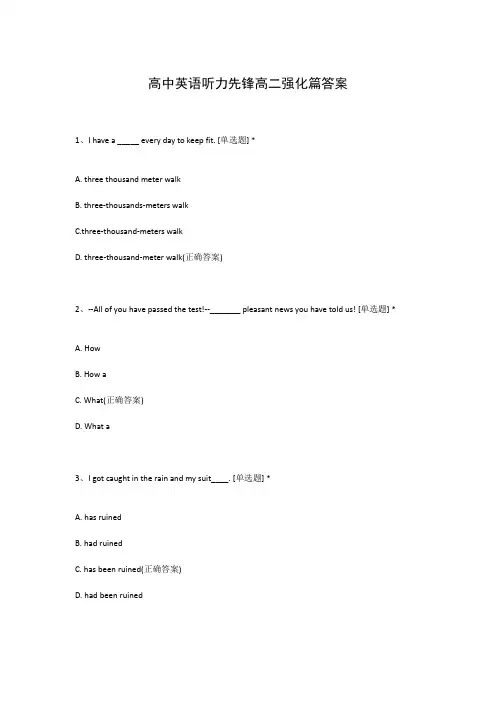
高中英语听力先锋高二强化篇答案1、I have a _____ every day to keep fit. [单选题] *A. three thousand meter walkB. three-thousands-meters walkC.three-thousand-meters walkD. three-thousand-meter walk(正确答案)2、--All of you have passed the test!--_______ pleasant news you have told us! [单选题] *A. HowB. How aC. What(正确答案)D. What a3、I got caught in the rain and my suit____. [单选题] *A. has ruinedB. had ruinedC. has been ruined(正确答案)D. had been ruined4、Lily is a very_____person and never wastes anything. [单选题] *A.generousB.economical(正确答案)C.economicD.efficient5、Though my best friend Jack doesn’t get()education, he is knowledgeable. [单选题] *A. ManyB. littleC. fewD. much(正确答案)6、Though the _____ drama is wonderful, I guess most audiences will be tired as it is too long. [单选题] *A. four-hour(正确答案)B. four hoursC. four-hoursD. four-hour's7、Some people were born with a good sense of direction. [单选题] *A. 听觉B. 方向感(正确答案)C. 辨别力D. 抽象思维8、The early Americans wanted the King to respect their rights. [单选题] *A. 统治B. 满足C. 尊重(正确答案)D. 知道9、There is a popular belief _____schools don’t pay any attention to spelling. [单选题] *A.that(正确答案)B.whichC.whatD.whose10、He was very excited to read the news _____ Mo Yan had won the Nobel Prize for literature [单选题] *A. whichB. whatC. howD. that(正确答案)11、--Could you please tell me _______ to get to the nearest supermarket?--Sorry, I am a stranger here. [单选题] *A. whatB. how(正确答案)C. whenD. why12、It is my _______ to meet you here. [单选题] *A. pleasure(正确答案)B. pleaseC. pleasedD. pleasant13、_____from far away, the 600-meter tower is stretching into the sky. [单选题] *A. SeeB. SeeingC. To seeD. Seen(正确答案)14、It’s reported that there are more than 300?_______ smokers in China. [单选题] *A. million(正确答案)B. millionsC. million ofD. millions of15、There are still some wild tigers alive. [单选题] *A. 聪明的B. 凶恶的C. 野生的(正确答案)D. 珍贵的16、People cut down many trees ______ elephants are losing their homes. ()[单选题] *A. ifB. butC. so(正确答案)D. or17、Nuclear science should be developed to benefit the people_____harm them. [单选题] *A.more thanB.other thanC.rather than(正确答案)D.better than18、She works in a hospital. She is a(n) _______. [单选题] *A. managerB. engineerC. doctor(正确答案)D. patient19、She and her family bicycle to work, _________ helps them keep fit. [单选题] *A. which(正确答案)B. whoC.itD. that20、Her ideas sound right, but _____ I'm not completely sure. [单选题] *A. somehow(正确答案)B. somewhatC. somewhereD. sometime21、The organization came into being in 1 [单选题] *A. 开始策划B. 进行改组C. 解散D. 成立于(正确答案)22、He prefers to use the word “strange”to describe the way()she walks. [单选题] *A. in which(正确答案)B. by whichC. in thatD. by that23、I took?some _______of the Great Wall?in China last year. [单选题] *A. potatoesB. tomatoesC. photos(正确答案)D. paintings24、Which is _______ city, Shanghai, Beijing or Chengdu? [单选题] *A. largeB. largerC. largestD. the largest(正确答案)25、The teacher has his students_____a composition every other week. [单选题] *A.to writeB.writtenC.writingD.write(正确答案)26、I usually read English _______ six o’clock _______ six thirty in the morning. [单选题] *A. from;?atB. from; to(正确答案)C. at; atD. at; to27、Catherine has two cousins. One is quiet, and _______ is noisy. [单选题] *A. anotherB. the other(正确答案)C. othersD. other28、Last year Polly _______ an English club and has improved her English a lot. [单选题] *A. leftB. sawC. joined(正确答案)D. heard29、Mary _______ a phone call with her mother now. [单选题] *A. will makeB. madeC. is making(正确答案)D. makes30、These plastics flowers look so_____that many people think they are real. [单选题] *A.beautifulB.artificialC.natural(正确答案)D.similar。
所谓的光辉岁月,并不是以后,闪耀的日子,而是无人问津时,你对梦想的偏执。 放弃很简单,但你坚持到底的样子一定很酷! 1 高中英语听力强化训练 Test 9
asf听力文件无病毒,请放心打开 听力理解 第一节(共5小题;每小题1.5分,满分7.5分) 听下面5段对话,每段对话后有一个小题,从题中所给的A、B、C三个选项中选出最佳选项,并标在试卷的相应位置。听完每段对话后,你都有10秒钟的时间来回答有关小题和阅读下一小题。每段对话仅读一遍。 1. What will the man have for breakfast? A. Eggs. B. Bread. C. Coffee. 2. Why does Tom visit Tracy? A. To say sorry to the woman. B. To borrow some milk. C. To help cook the meal. 3. Where are the two speakers? A. Up the stairs. B. In a building. C. In the secretary’s office. 4. What time should the two speakers arrive at Jim’s house? A. At least before 4:45. B. At least before 5:00. C. At least before 5:30. 5. What does the man offer to do? A. Drive for the woman. B. Move the car to a car park. C. Carry the boxes for the woman.
第二节(共15小题;每小题1.5分,满分22.5分) 听下面5段对话或独白。每段对话或独白后有几个小题,从题中所给的A、B、C三个选项中选出最佳选项,并标在试卷的相应位置。听每段对话或独白前,你将有时间阅读各个小题,每个小题5秒钟;听完后,各小题将给出5秒钟的作答时间。每段对话或独白读两遍。 听第6段材料,回答6~8题。 6. What are they going to do tomorrow? A. Go swimming. B. Go shopping. C. Go skating. 7. What will the weather be like tomorrow? A. Warm. B. Cold. C. They have no idea. 所谓的光辉岁月,并不是以后,闪耀的日子,而是无人问津时,你对梦想的偏执。 放弃很简单,但你坚持到底的样子一定很酷! 2 8. When will the man ring her? A. Next morning. B. That morning. C. The day after tomorrow. 听第7段材料,回答9~11题。 9. Which flight did the woman get to Chicago at last? A. The 8:30 flight. B. The 9:45 flight. C. The 11:15 flight. 10. What was the woman going to Chicago to do? A. To spend the weekend with her brother. B. To get a ticket for the flight. C. To see her brother. 11. Where did they have a talk? A. At a station. B. In a post office. C. In an airport. 听第8段材料,回答12~14题。 12. Who was telephoning a message to Larry? A. His Friend. B. Bob. C. The woman. 13. What did the man ask Larry to do? A. Ask Larry to take some oranges to the party. B. Ask Larry to bring some drinks to the party. C. Ask Larry to bring something delicious to the party. 14. What was the woman doing while she was answering the call? A. She was taking the message down. B. She was drinking a bottle of orange. C. She was sending someone to ask Larry. 听第9段材料,回答15~17题。 15. What kind of colour TV will the man want to buy? A. A smaller one. B. A bigger one. C. A cheaper one. 16. What is the woman’s opinion about buying a colour TV? A. A smaller one. B. A bigger one. C. An expensive one. 17. Why does the woman suggest that the man should buy a smaller TV? A. Because that would be a waste of money. B. Because he might have to change it in a few years’ time. C. Because his sitting-room isn’t very big. 听第10段材料,回答18~20题。 所谓的光辉岁月,并不是以后,闪耀的日子,而是无人问津时,你对梦想的偏执。 放弃很简单,但你坚持到底的样子一定很酷! 3 18. What does the speaker want to talk about? A. Computers. B. Machines. C. Inventions. 19. According to the speech, which of the following is the latest invention? A. Computers. B. Planes. C. Trains. 20. Why must we study hard according to the speech? A. Because we often read books printed by printing machines. B. Because we must do as the scientists do. C. Because we want to learn a lot of scientific knowledge and invent more and more modern machines.
第一节 1. W: Good morning, dear. Do you want eggs for breakfast? M: No, thanks. I’m late. Just some coffee, please. 2. W: (There is a knock at the door.) Who is it? M: It’s me, Tom. Sorry to trouble you, Tracy. But I just ran out of milk. Could you lend me some? W: Yeah. No problem. Come in. Here you are. 3. M: Excuse me. Could you tell me where the secretary’s office is, please? W: Yes. It’s up the stairs, straight to the end of the passage and there you are. M: Thank you. 4. W: What time is it? M: It’s a quarter to five. W: Aren’t we supposed to be at Jim’s house by five o’clock? M: Five or five thirty. He said it didn’t make any difference. 5. M: Can I help you with those boxes? W: Huh? Why, yes. That’s very kind of you. M: No trouble at all. Where’s your car? W: Right over there. The white one. 第二节 第6段 W: Would you like to go skating tomorrow? M: That sounds great. I haven’t gone skating for a long time. But wait a moment! Is it warm tomorrow? W: Oh, I hadn’t heard that. M: I’m quite sure it will be fine. I heard it on the radio. W: If so, going skating wouldn’t be a very good idea. Let’s wait and see what the weather is like tomorrow. M: OK. I’ll call you in the morning.